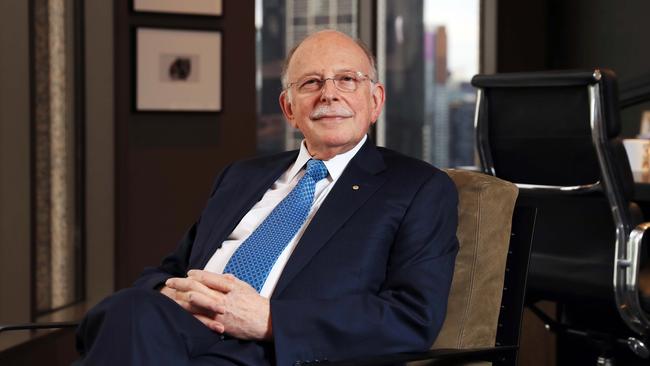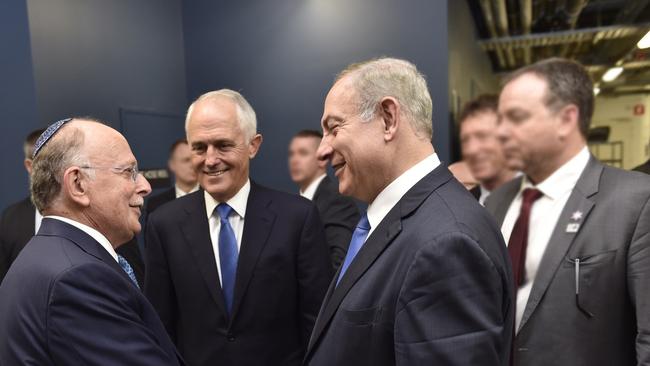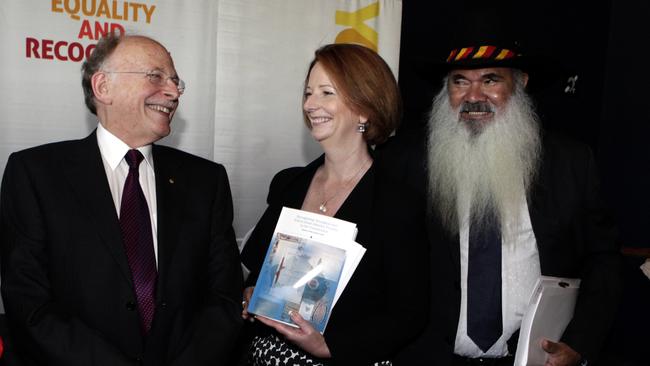Mark Leibler, his ‘lobby’ and their legacy
Once accused of ‘menacing’ Kevin Rudd, Australia’s most powerful Jewish leader has largely succeeded in shutting down criticism of Israel, gathering enemies in the process.

In the morning of a warm late summer’s day last year, Mark Leibler is getting ready to travel to Israel. We are sitting at a small table in his office, but he is oblivious to the sweeping views of the city that shimmers in the sunlight.
This trip is the first of three visits to Israel Leibler will make in 2019 — this first one in summer, another in midwinter and the last one in spring. He has made these visits for 25 years, ever since he was elected to the two major international Jewish organisations that help determine how the substantial sums of money raised in diaspora communities will be spent on projects in Israel and, increasingly, in diaspora Jewish communities, especially the six-million-strong US community.
Even when he is in Israel, when his days are packed with meetings, he will be in constant touch with his office at Arnold Bloch Leibler, where he has been a partner for almost 50 years. He will take and make calls at any time of the day and night, talking to Jewish community leaders and Indigenous leaders who regularly seek him out for advice. Leibler is a man of many parts and he has learnt to move across these parts — from lawyer to Jewish leader to activist on behalf of Indigenous causes — so that each part enriches the others.
He is not well known to most Australians. His name does not appear in the newspapers often, though he has become, over the years, the go-to tax lawyer for financial journalists. Yet his influence far exceeds his public profile. Of the 200 people and families on the 2019 Rich List, nearly one in five are clients of Arnold Bloch Leibler. Partly as a result of this client base, Leibler is widely recognised as one of Australia’s most influential tax lawyers. He has given advice and put the case for changes to tax laws to every Australian treasurer since John Howard had the job in the 1970s.
Since the late 1990s, when his older brother, Isi, pre-eminent leader of Jews in Australia and a major figure in world Jewry, settled in Israel, Mark Leibler has been recognised as Australia’s most influential and powerful Jewish leader, and has become increasingly influential in international Jewry. The Jerusalem Post has described him as one of the world’s 50 most influential Jews. He has had, and still has, relationships with Israeli politicians, including prime ministers.

Anyone who has lived such a public life, and has been involved in so many different and seemingly unconnected areas, is bound to have critics and even enemies. Leibler has both. Former senior Australian Taxation Office officials who have had dealings with him have said he has a reputation as a bully who intimidates junior staffers conducting audits of his clients. Within the Jewish community, he has a reputation for being arrogant and a formidable and difficult opponent. Academic and writer Mark Baker, a lifelong Zionist, believes that Leibler has tried and has largely succeeded in shutting down any criticism of Israel in the Jewish community.
Care and concern
Over 40 or more years of public life, Leibler has developed and sustained close relationships — he calls them friendships — with senior Australian politicians, from Bill Hayden when he was foreign minister in the Hawke government to prime ministers John Howard, Paul Keating and Julia Gillard. Keating calls Leibler a friend. Gillard says that in her most difficult days as prime minister, she felt from him “a care and concern about me as a human being”. Indigenous leader Noel Pearson considers Leibler to be not just a mentor who taught him about the workings of power, but a father figure.
Others, such as Kevin Rudd when he was prime minister and foreign minister, and Bob Carr when he replaced Rudd as foreign minister, do not share such warm assessments of him. Both Rudd and Carr came to believe that Leibler and the “Israel lobby”, as they called it and which Leibler led, was a malign force in Australian politics, one that distorted Australia’s policies on the conflict between Israel and the Palestinians, and turned many politicians and journalists into the lobby’s puppets, or, to use Carr’s word, “poodles”. Rudd came to believe that the lobby and Leibler in particular helped organise the coup that saw him replaced as prime minister by Gillard.
It was the so-called passports affair that solidified Rudd’s conviction that the Israel lobby was out to get him. On May 16, 2010, Australia expelled an Israeli diplomat who was also a senior agent of Israeli security service Mossad, after Mossad agents had used fake Australian passports to enter Dubai. There they had assassinated one of the top arms dealers of Hamas, the Palestinian Islamist organisation that since 2007 has been the de facto governing authority in the Gaza Strip.
Rudd declared that the relationship with Israel had been affected by this “outrageous” use of fake Australian passports. He said this was especially so, given that Mossad had used Australian passports for another operation in 2003, the details of which neither Israeli nor Australian security officials have ever disclosed. After the 2003 incident, according to Rudd, Mossad had given ASIO a secret undertaking never to use Australian passports for any Israeli security exercise again.
Leibler, the chairman of the Australia Israel and Jewish Affairs Council, the powerful and privately funded lobbying organisation for Israel, took extensive notes about the passports fiasco. These notes show the extent to which this crisis challenged and consumed him. They also show that he could reach out to cabinet ministers and senior public servants, who invariably took his calls or agreed to see him. The passports incident was especially difficult, because it was impossible to defend what the Israelis had done.
Leibler has notes of conversations with foreign minister Stephen Smith and with other members of the Rudd government, as well as with senior Foreign Affairs officials, including Dennis Richardson, then head of the Department of Foreign Affairs and Trade. His notes record a meeting on May 27, 2010, with Richardson, who had been head of ASIO when Israeli agents had used fake Australian passports in 2003. At the meeting, Richardson said that a memorandum of understanding had been drawn up after the 2003 incident, which spelled out that Mossad would not use Australian passports again.
Leibler told Richardson that on his next visit to Israel he would arrange a meeting with the head of Mossad to convey his concerns, and Richardson’s, about the further use of Australian passports. Leibler’s notes also reveal he told Richardson that Rudd had overreacted by expelling the Israeli diplomat, but that Leibler knew Israel did not have a strong case to argue over the expulsion. He wanted to settle this issue and for things to “move on”. He wanted to make it clear to Richardson that he, Leibler, could convey to Israeli leaders, including the head of Mossad, Richardson’s concerns.
Rudd gave his version of these events in the second volume of his memoirs, The PM Years, published in late 2018. Rudd writes in his book that what he called the Israel lobby had tried to “menace” him for his strong response to the passports affair.
On June 1, 2010, Mark Dreyfus, later Gillard’s attorney-general, called Leibler, who he had known for many years. Dreyfus told Leibler that Rudd wanted to have a dinner with Leibler and a few other Jewish community leaders at the prime minister’s Canberra residence on June 3 to discuss the passports issue. The dinner was intended to begin the process of repairing the strained relationship between Rudd and the Jewish community, at least with its leaders, such as Leibler. Jewish MP Michael Danby was present, as was Dreyfus.
What happened at that dinner is contested. Rudd writes in his book that he agreed to host the dinner out of respect for Danby and Dreyfus, who had lobbied him to put on a dinner for the Jewish leaders. According to Rudd, he sat politely at the table while Leibler berated him for committing the “hostile act” of expelling the Israeli diplomat.
Rudd writes that he told Leibler that it had been the second time that Israel had used fake passports but that Leibler had responded: “I don’t believe you.” When he offered Leibler a briefing with Richardson, Leibler turned angry and made a “menacing threat”. Rudd records Leibler as saying: “Julia is looking very good in the public eye these days, Prime Minister. She’s performing very strongly. She’s a great friend of Israel. But you shouldn’t be anxious about her, should you, Prime Minister.”
None of these incidents that Rudd recalls so vividly are in the nine pages of notes, dated June 7, that Leibler typed after the dinner. Leibler had made handwritten notes in his hotel room immediately after the dinner, before he flew back to Melbourne the next morning. None of the other guests at the dinner supported Rudd’s accusation that Leibler had menaced and threatened him at the dinner.
Leibler writes that when he was leaving he took Rudd aside and assured him that he was going to raise Rudd’s concerns over the passports issue with both the head of Mossad and with Prime Minister Benjamin Netanyahu.
The conflicting versions of what happened at that dinner, less than two weeks before Gillard deposed Rudd as prime minister, are revealing. Rudd’s version looks back, after everything that had happened to him. It seems that Gillard’s “betrayal” of him and the way she became close to Leibler when she was prime minister came together for Rudd, in retrospect. He had decided that the Israel lobby, Leibler in particular, had supported Gillard’s challenge to him and indeed, had spent a year organising the Gillard coup. On any reading, this was an extraordinary explanation for what had happened to him.
‘Poodle’ politicians
In February 2012, Rudd resigned as foreign minister in order to challenge Gillard for the Labor leadership. He lost his challenge comprehensively. With Rudd finally out of cabinet, Julia Gillard considered it something of a political coup when former NSW Premier Bob Carr agreed to fill the Senate vacancy left by the resignation of prominent NSW Right faction member Mark Arbib, and to take over as foreign minister.
In his memoir, Run for Your Life, published by Melbourne University Publishing in 2018, Carr sketched his journey of disillusionment with Israel and with its supporters in Australia in particular. In a chapter entitled Me and ‘The Lobby’, Carr writes like a spurned lover — as someone who over many years did much to promote the cause of Israel and the Australian Jewish community, only to be rejected, betrayed, cast out of the Jewish family.
The point when the love affair went sour, at least publicly, was in 2003 when, as premier, he accepted the invitation to present the Sydney Peace Prize to Palestinian activist Hanan Ashrawi, of which he writes: “The storm of criticism that then occurred was a shock … and an insight … Soon after my participation was announced, Jewish leaders launched an international campaign to force me to withdraw from the award … There were threats of funding being withdrawn from the university … Letters of protest were dispatched about the awards going to a Palestinian, switchboards were set aflame with indignation.”
Carr writes that it was not until the Israel lobby publicly spurned him, pressured him to change his mind over Ashrawi, sent him scores of messages and called him all sorts of names, that he realised how powerful it was: “The hold of the Israel Lobby over Australian politicians is based on two facts. First, donations to the political parties from the Jewish community leadership; second, paid trips to Israel extended to every member of parliament and journalists. From the Australia/Israel and Jewish Affairs Council over 700 trips alone … No other community, in my experience, treats politicians as their poodles.”
One of those treated as a poodle, Carr implies, was Gillard, in whose cabinet he had served as foreign minister. Eight months after Carr’s appointment as foreign minister, his relationship with Gillard had become troubled, at best. In late November 2012, the government had to decide what position to take on a looming UN vote on a resolution granting “non-member” status to Palestine. Carr was determined that Australia should vote in favour of the resolution; Gillard was adamant that Australia should vote against it.

She was convinced that a vote in favour of recognising Palestine as a state would do nothing for the Palestinians, and would at the same time extinguish what she accepted was the faint hope of a negotiated two-state settlement between Israel and the Palestinians. Given how strongly she felt about this, she thought it was her call as prime minister. She was sure that cabinet would back her.
Carr lobbied his fellow cabinet ministers and members of the NSW Labor Right to back his position on the resolution. Carr was now committed to rolling Gillard on this issue. This would be a rare occurrence, were it to happen, for any prime minister, but particularly troubling for one leading a minority government. In the end, Gillard accepted a compromise: Australia would abstain from voting. In reality, she had been defeated. The issue had come close to finishing her as prime minister.
Carr’s life ‘made hell’
In his Diary of a Foreign Minister, published in 2014, Carr describes how the Israel lobby had made his life hell whenever he wanted to issue a statement as foreign minister on any issue involving Israel and the Palestinians. Even on a “routine expression of concern about the spread of settlements”, there was inevitable pushback from the lobby. And Gillard had taken to vetting every statement he made on Israel and the Palestinians.
Carr did not respond to requests for an interview. More than a year after I had made the requests, Carr called. He said he had not responded to the requests because he had no interest or reason to say anything about Leibler. He had played a critical role in loosening the grip that the Israel lobby had on Australian Middle East policies. Asked whether Gillard had been a captive of the Israel lobby, Carr said he was “not going to speculate about that. There is no point in doing so now.”
When we talked, Gillard was reluctant to answer questions about Rudd and Carr. She said she had been surprised how emotional Carr became about Israel and Palestine. She said that he must have known about the issues she had with Rudd about Middle East policy and that she was on good terms with Leibler. She had made no secret of any of this: “There had been an emerging drumbeat about our position on UN resolutions but I never thought it was a major issue until Bob Carr got caucus and cabinet all het up about it. I don’t personally feel like I understand the degree of emotional attachment that Bob ended up having on this issue. I didn’t understand it then and I don’t understand it now.”
Asked about the influence Australia Israel and Jewish Affairs Council and Leibler had on her decision-making as prime minister, she said: “I was always open to hearing different views, but people make their own choices, and you don’t fall from the sky in making those choices. You are an inheritor of a political tradition. I was very conscious of being a Labor prime minister, of being an inheritor of what I think is a very precious political tradition and that political tradition is one of support for Israel and advocacy for a two-state solution. The actions I took as prime minister were in line with that long-term inherited Labor wisdom and tradition.”
This is an edited extract of The Powerbroker by Michael Gawenda, published by Monash University Publishing, out today. The book will be launched at 6pm on Monday by Julia Gillard and Noel Pearson. To view the launch visit monash.edu/news




To join the conversation, please log in. Don't have an account? Register
Join the conversation, you are commenting as Logout